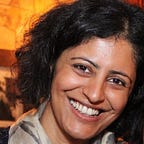An Unofficial Guide to Seven Stages of Reviewing for CHI
“Every year, hundreds of associate chairs (ACs) on the ACM CHI program committee (PC) struggle to identify and onboard reviewers, who in turn spend days making sense of the CHI reviewing process. In our *unofficial* reviewing guide (intended to be a living, community-sourced document), we provide a comprehensive list of questions to ask ourselves (and hold others accountable with), in our roles as reviewers, authors, ACs, and subcommittee chairs (SCs) — both new and experienced. This is not official guidance from the SIGCHI Executive Committee, CHI Steering Committee, or CHI 2021 Organizing Committee, but a grassroots community effort to help guide conversations around reviewing. We also provide links to resources provided by members of the CHI community through the years for demystifying parts of this process for authors and reviewers.
Multiple motivations have spurred this effort. First, the process of reviewing for CHI is not always straightforward, rendering the inclusion of first-time CHI reviewers a challenging undertaking. New reviewers are increasingly from backgrounds that are culturally and disciplinarily diverse and underrepresented at CHI, unfamiliar with “CHI culture”, but our practices of onboarding these reviewers are yet to catch up. With this guide, we aim to support an active onboarding process that leaves these reviewers in a stronger position to contribute to/shape this culture as well. Second, even returning reviewers find that the CHI process is continually changing, and we hope that this can serve as a resource for them as well. Third, we aim to reduce the opacity of this process and encourage good (and better) practices for submitting authors reasonably new to CHI. Fourth, reviews of work done in contexts relatively understudied at CHI, such as research with vulnerable populations, studies done in the Global South, or social justice-oriented research, sometimes come across as problematic. We can do better. Finally, for our community at large, we aspire to foster a practice of reading generously and being nurturing and constructive towards each other’s scholarship.”
This above is an excerpt from our living document. We invite you to contribute, and are grateful for the contributions from Elena Agapie, Rosa Arriaga, Syed Ishtiaque Ahmed, Nazanin Andalibi, Robin Brewer, Emiline Brulé, Tessy Cerratto-Pargman, Lewis Chuang, Rob Comber, Sauvik Das, Munmun De Choudhury, Nicki Dell, Melissa Densmore, Susan Dray, Radhika Garg, Mayank Goel, Azra Ismail, Mohit Jain, Shagun Jhaver, Naveena Karusala, Joseph Konstan, Pejman Mirza-Babaei, Briana Morrison, Michael Muller, Maryam Mustafa, Bonnie Nardi, Mark Perry, Pedro Reynolds-Cuéllar, Chiara Rossitto, Nithya Sambasivan, David A. Shamma, Katta Spiel, Bill Tomlinson, Kentaro Toyama, Aditya Vashistha, Nervo Verdezoto, Jim Wallace, Maria Wolters, and Diyi Yang, that have helped make this what it is (as of September 14th).
Neha Kumar & Shaowen Bardzell
PS: Though a friend suggested this might be a more appropriate visual:
